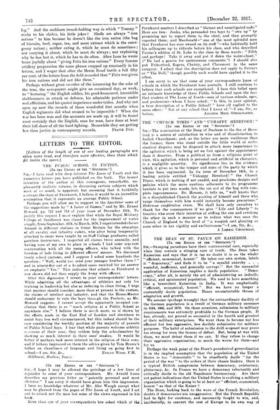LETTERS TO THE EDITOR.
[Letters of the length of one of our leading paragraphs are often snore read, and therefore more effective, than those which
fill treble the space.] --
THE PUBLIC SCHOOL IN FICTION.
[To THE EDITO3 or THE SPECTATOR..1
Lase read with deep interest The Loom of Youth and the numerous letters you have published on the book. The honest intention of the author of this courageous, remarkable, un- pleasantly realistic volume, in discussing certain subjects which most of us avoid, is apparent, but assuming that it faithfully tort rays the stole of Fernhurst, I believe it would be an incredible assumption that it represents an average Public School.
Perhaps you will allow me to support in the Spectator some of the suggestions made by " A Lover of Games," and by Mr. Ernest Howard, pp. 712 and 713 of your issue of December 15th. To justify this request I mr.st explain that while the Royal Military College at Sandhurst was closed for the improvement of water supply, from September, 1874, to March. 1876. I superintended classes formed in different statism in Great Britain for the education of all cavalry and intentrY cadets, who after being temporarily attached to corps were taught by ex-Staff College graduates called garrison instructors. I inspected all classes twice annually, and having sons of my own to place in schools I had some separate conversation with all the young officers, who talked with the freedom of lads living in different officers' messes. We discussed freely school customs, mid I suppose I asked some hundreds the question "Well, would you send your younger brother there F" and in ninety-five out of a hundred cases received for an answer an emphatic "Yes." This indicates that schools as Fernhurst is now shown did not then supply the Army with officers.
After this digression I revert to your correspondents' letters. While admitting all the advantages of athletics not only for training in leadership but also as inducing to clean living, I urge that masters should consider, more than at present is the custom, the claims of intellect and industry, and that the House-Master should endeavour to rule the boys through the Prefects, as Mr. Howard suggests. I cannot accept the apparently accepted con- clusion that there is as " much religion at a Public School as anywhere else." I believe there is much more, as ie shown by the efforts made in the East End of London and elsewhere to assist boys less well circumstanced, but this indeed should be the case considering the worldly position of the majority of parents of Public School boys. I fear that while parents welcome athletic successes of their sous, they seldom help the schoolmasters by showing as much interest in their sons' studies. It would be Getter if mothers took more interest in the religion of their Sons, and if fathers impressed on them the advice given by Tom Brown's father on cleanliness of language and living on going first to


























 Previous page
Previous page